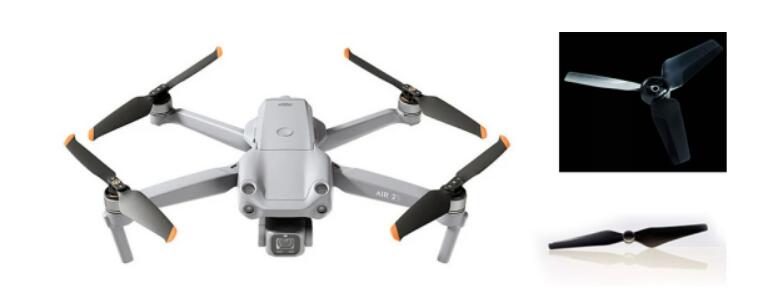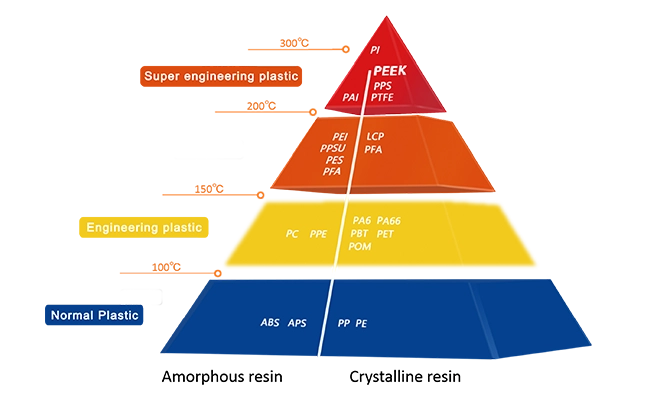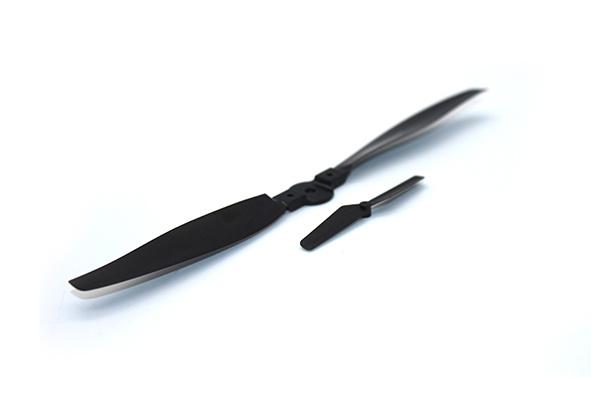Product name: PEEK impeller customization/injection molding/machining, PEEK blade customization/injection molding/machining
Product material: PEEK and series modified materials (materials are recommended according to actual working conditions)
Material features: low density, light weight, high strength, wear resistance, corrosion resistance, high temperature resistance (normal use 260 degrees, short-term use temperature 300 degrees), dimensional stability, etc.
Development trend: can gradually replace traditional metal materials
Application scope: aviation, aerospace and other fields
Application areas: temperature control facilities, steering systems, UAV power systems, etc.
With the progress of society and the development of science and technology, the application areas and user groups of drones are expanding, and drone software systems and hardware materials are also constantly improving. Composite materials with better performance are the cornerstone for drones to achieve industrial explosion and expansion of application areas.
Among them, UAV propeller blades are an important component with high technical content, complex manufacturing process and stringent material performance requirements. The choice of blade material affects whether the UAV flight mission can be successfully completed and whether the flight is stable and long-lasting.

PEEK material has good comprehensive properties. Its application in UAV blades is characterized by:
1. Weight reduction and noise reduction: After using PEEK and short fiber composite materials, the weight can be reduced while maintaining the excellent performance of the fuselage material, improving the strength of the blade itself, better dynamic balance, and more silent and noise reduction effects. With.
2High strength: Compared with traditional metal materials, it has the characteristics of high specific strength and specific stiffness. If it encounters collision with other foreign objects during flight, the special material of the blades will make the blades less likely to be damaged and can maintain the normal flight of the drone.
3. Good flight stability: PEEK and its composite materials have a small thermal expansion coefficient, strong fatigue resistance and vibration resistance, and can be used normally in harsh environments. The blades are not easily deformed by the external environment and have a long service life.
What is PEEK?
PEEK and its modified composite materials show excellent performance under high temperature and high humidity conditions. PEEK have excellent chemical corrosion resistance, self-lubricating, and wear-resistant properties, so it has become the most ideal material to replace copper alloys and ordinary rubber. Compared with them, PEEK has longer service life which can reduce equipment operating costs, improve equipment operating reliability.


High Temperature Performance
PEEK’s performance can remain stable in the temperature range from -196°C to 260°C. Under extreme working conditions, it can withstand 300″C for a short time. The performance of PEEK is still reliable even in high temperatures of several kilometers underground work environment.

High Strength and Wear Resistance
Compared with other plastics, PEEK is resistant to compression, impact and also have good fatigue resistance. PEEK is durable in mechanical equipment and wear-resistant environments.

Double the Service Life
PEEK sealing solutions can improve the part service life. Some domestic chemical companies use the PEEK5600FE20 polytetrafluoroethylene modified material designed by Junhua to replace the original material, the service life of the wear parts can even be extended by 1.3-3 times.

Corrosion Resistance
PEEK is chemically inert, and has no reaction to most acids, oils, greases and all other organic and inorganic solvents or enzymes, and can still maintain good strength and dimensional stability.

Self-lubricating
PEEK has low friction coefficient, low running resistance, can be used without oil in some working conditions. The equipment is cleaner, thus improving process reliability, improving energy efficiency and saving costs.

More dom in Design
Injection molds can be used for rapid injection molding of large quantities of complex special-shaped parts, and the cost is low compared to machining.
Contact Us
Common PEEK Grades and Properties
1. PEEK5600G (brown-gray/khaki) is made from pure polyetheretherketone resin and offers the best toughness and impact resistance of all PEEK grades. Pure PEEK can be sterilized using convenient methods (steam, dry heat, ethanol, and gamma-rays), and the raw materials used in its manufacture comply with EU and US FDA food compatibility regulations. These characteristics make it widely used in the medical, pharmaceutical, and food processing industries.
2. PEEK5600LF30 (black) The addition of PTFE, graphite, and carbon fiber makes PEEK5600LF30 a bearing-grade plastic. Its superior tribological properties (low coefficient of friction, wear resistance, and high peak pressure limit) make it an ideal material for this class of friction applications.
3. PEEK5600GF30 (Brown-Gray): This material is a reinforced grade of plastic filled with 30% glass fiber. It offers superior rigidity, creep resistance, and dimensional stability compared to PEEK, making it ideal for structural parts. It can withstand fixed loads for extended periods at high temperatures. If PEEK5600GF30 is used as a sliding component, its suitability should be carefully verified, as the glass fiber can scratch mating surfaces.
4. PEEK5600CF30 (Black): This material is reinforced with 30% carbon fiber. It offers superior mechanical properties (higher elastic modulus, mechanical strength, and creep resistance) and wear resistance compared to PEEK5600GF30. Furthermore, carbon fiber-reinforced plastic has 3.5 times the thermal conductivity of unreinforced PEEK, dissipating heat more quickly from the bearing surface.
Mechanical Properties
| Item | Test Standard or Instrument |
Unit | PEEK5600G 100% PEEK |
PEEK5600GF30 PEEK+30% glass fiber |
PEEK5600CF30 PEEK+30% carbon fiber |
PEEK5600LF30 PEEK+30% (carbon fiber +graphite+PTFE) |
PEEK5600FE20 PEEK+20%PTFE |
|---|---|---|---|---|---|---|---|
| Tensile Strength (23℃) | ISO 527 | MPa | 95 | 175 | 250 | 145 | 70 |
| Tensile Modulus (23℃) | ISO 527 | GPa | 3.8 | 11 | 23 | 12.5 | / |
| Elongation at Break (23℃) | ISO 527 | % | 35 | 2.0 | 1.5 | 2.2 | / |
| Flexural Strength (23℃) | ISO 178 | MPa | 155 | 235 | 350 | 220 | 118 |
| Flexural Modulus (23℃) | ISO 178 | GPa | 3.5 | 10 | 21 | 11 | / |
| Charpy Impact Strength (unnotched) | ISO 179/1U | kJ/m2 | No break | 55 | 45 | 32 | No break |
| Cantilever Beam Impact Strength (notched) | ISO 180/A | kJ/m2 | 4 | 6 | 6.5 | 4 | 6 |
Thermal Properties
| Item | Test Standard or Instrument |
Unit | PEEK5600G 100% PEEK |
PEEK5600GF30 PEEK+30% glass fiber |
PEEK5600CF30 PEEK+30% carbon fiber |
PEEK5600LF30 PEEK+30% (carbon fiber +graphite+PTFE) |
PEEK5600FE20 PEEK+20%PTFE |
|---|---|---|---|---|---|---|---|
| Melting Point | ISO11357 | ℃ | 343 | 343 | 343 | 343 | 343 |
| Glass Transition Temperature | ISO11357 | ℃ | 143 | 143 | 143 | 143 | 150 |
| Heat Deflection Temperature | ISO 75A/B | 1.8MPa. ℃ | 152 | 315 | 315 | 293 | 150 |
| Thermal Expansion Coefficient | ASTM D696 | ppm K-1 | 45 | 22 | 15 | 22 | 70 |
| Thermal Conductivity | ISO /CD22007-4 | W/(m·K) | 0.29 | 0.32 | 0.95 | 0.86 | / |
Electrical Properties
| Item | Test Standard or Instrument |
Unit | PEEK5600G 100% PEEK |
PEEK5600GF30 PEEK+30% glass fiber |
PEEK5600CF30 PEEK+30% carbon fiber |
PEEK5600LF30 PEEK+30% (carbon fiber +graphite+PTFE) |
PEEK5600FE20 PEEK+20%PTFE |
|---|---|---|---|---|---|---|---|
| Dielectric Strength (2mm) | IEC 60243-1 | kV/mm | 20 | 19 | / | / | 19 |
| Dielectric Constant | IEC 62631 | – | 3.0 | 3.3 | / | / | 2.7 |
| Surface Resistivity | GB/T31838.3 | Ω | 1015 | 1014 | / | / | 1015 |
| Volume Resistivity | IEC 62631 | Ω·cm | 1015 | 1015 | 105 | 106 | / |
Other Properties
| Item | Test Standard or Instrument |
Unit | PEEK5600G 100% PEEK |
PEEK5600GF30 PEEK+30% glass fiber |
PEEK5600CF30 PEEK+30% carbon fiber |
PEEK5600LF30 PEEK+carbon fiber +graphite+PTFE |
PEEK5600FE20 PEEK+20%PTFE |
|---|---|---|---|---|---|---|---|
| Color | / | / | Natural | Natural | Black | Black | Natural |
| Melt Flow Index (400℃, 2.16kg) | ISO 1133 | g/10min | 6-10 | 2-5 | 1-3 | 2-5 | / |
| Density | ISO 1183 | g/cm3 | 1.30±0.02 | 1.50±0.02 | 1.40±0.02 | 1.44±0.02 | 1.41±0.02 |
| Water Absorption (23℃, 24Hrs) | ISO 62-1 | % | 0.07 | 0.05 | 0.04 | 0.05 | 0.15 |
| Rockwell Hardness | / | HRR | 118 | 119 | 121 | 108 | 113 |
| Flammability Rating | UL 94 | / | V-0 | V-0 | V-0 | V-0 | / |
| Coefficient of Friction | ASTM D3702 | 100N-120rpm | 0.30-0.38 | 0.38-0.46 | 0.15-0.25 | 0.18-0.30 | 0.1-0.2 |
*This data is for reference and not a guarantee. For a more detailed data sheet, please contact our company’s technical department.
Service
Junhua offers one-stop PEEK solutions from design to after-sales, ensuring quality, innovation, and customer satisfaction.
Design and processing
Junhua offers injection molding, machining, and extrusion solutions to optimize design and cost.
Material selection
Junhua specializes in PEEK with multiple grades and recommends the best engineering plastics for your needs.
Measurement
Junhua uses high-precision instruments to provide customers with accurate drawings.
Sampling
Junhua supplies samples for testing and refines designs until approval for mass production.
Mass Production
Junhua controls raw materials, processes, and inspections to ensure consistent product quality.
Quality Control
Junhua follows ISO9001 standards and provides full inspection reports as required.
Improve
Junhua continuously optimizes designs and processes through improvement systems and case experience.
After-sales Service
Junhua offers complete after-sales support to resolve technical issues and protect customer interests.

